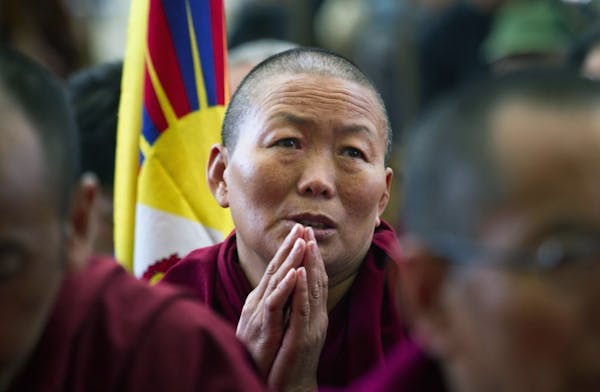China's new leader continues to quash hope that the inhumane treatment of Tibetans living under Chinese rule would ease under his tenure. Instead, harsh policies grow harsher.
Since 2009, about 100 Tibetan monks, nuns and others have set themselves on fire to protest the severe living conditions imposed on Tibetans. The United Nations, the European Parliament and the U.S. State Department cite human-rights violations.
But Xi Jinping, named to the Communist Party's top post in November, is following the same misguided path as his predecessor. Last week, China's courts handed down lengthy sentences for a monk and his nephew, originally charged with murder for allegedly inciting others to set themselves on fire.
Human Rights Watch, an international watchdog organization, says the men were forced to give false confessions during long detentions. The group says that at least a dozens Tibetans have been prosecuted over the past two years for alleged involvement with self-immolations. Six were convicted last month on charges of "intentional homicide."
"The ongoing prosecution of people linked with self-immolation appears to be about stifling dissent and laying blame on others for this tragedy," said Sophie Richardson, the group's China director. "It's time for China to respond to the grievances and human-rights violations that appear to be provoking this tragic form of protest."
Chinese forces have occupied Tibet for more than 60 years. In 1959, the Dalai Lama fled Tibet by crossing the Himalayas into Dharamsala, India, where Tibet's government-in-exile has its headquarters. He remains Tibet's spiritual leader, but two years ago turned over the political reigns to Lobsang Sangay, the democratically elected prime minister.
Sangay spoke with me in October during a visit to Minnesotan, home to the nation's second-largest Tibetan community. He and the Dalai Lama discourage immolations. They say Tibetans remain committed to nonviolence, which is why they're burning themselves rather harming Chinese.
After last week's convictions, Sangay accused China of conducting "sham" trials. The U.S. State Department also spoke out, urging China to rethink its policies in Tibet as well as to allow Tibetans the freedom to express their grievances without retribution.
President Obama, whose focus is on China's global market, hasn't been forceful about the Tibetan cause. Perhaps his new chief of staff, Minnesota native Denis McDonough, can be an influence. In a speech last year on international religious freedom, he summed up the situation perfectly:
"In China, government policies in Tibetan areas threaten the distinct religious, cultural and linguistic identity of the Tibetan people, creating tensions and contributing to a situation where dozens of desperate Tibetans have resorted to self-immolation."
------
Susan Hogan is a Star Tribune editorial writer.
Protect kids online

Here's how I'd broadly frame the environment that led to my firing as a teacher
Get rid of Minnesota's precinct caucuses, go to primary elections up and down the ballot


